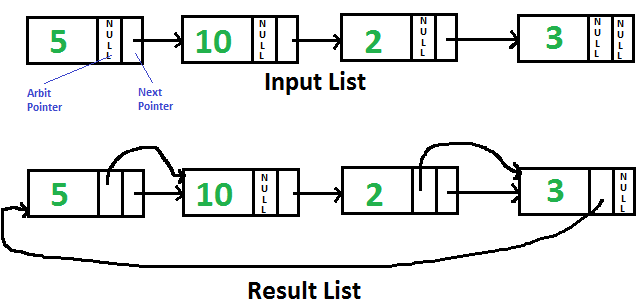Dada una lista enlazada individualmente con cada Node que tiene un puntero «arbitrario» adicional que actualmente apunta a NULL. Necesita hacer que el puntero «arbitrario» apunte al siguiente Node de mayor valor.

Recomendamos encarecidamente minimizar su navegador e intentarlo usted mismo primero.
Una solución simple es atravesar todos los Nodes uno por uno, para cada Node, encontrar el Node que tiene el siguiente valor mayor del Node actual y cambiar el puntero siguiente. La complejidad temporal de esta solución es O(n 2 ).
Una solución eficiente funciona en tiempo O(nLogn). La idea es usar Merge Sort para lista enlazada .
1) Atraviese la lista de entrada y copie el siguiente puntero en el puntero de arbitraje para cada Node.
2) Haga Merge Sort para la lista enlazada formada por punteros arbitrales.
A continuación se muestra la implementación de la idea anterior. Todas las funciones de clasificación de fusión se toman de aquí . Las funciones tomadas se modifican aquí para que funcionen en punteros de arbitraje en lugar de punteros siguientes.
C
// C program to populate arbit pointers to
// next higher value using merge sort
#include<stdio.h>
#include<stdlib.h>
// Link list node
struct Node
{
int data;
struct Node* next, *arbit;
};
// Function prototypes
struct Node* SortedMerge(struct Node* a,
struct Node* b);
void FrontBackSplit(struct Node* source,
struct Node** frontRef,
struct Node** backRef);
/* Sorts the linked list formed by
arbit pointers (does not change
next pointer or data) */
void MergeSort(struct Node** headRef)
{
struct Node* head = *headRef;
struct Node* a, *b;
// Base case -- length 0 or 1
if ((head == NULL) ||
(head->arbit == NULL))
return;
// Split head into 'a' and 'b'
// sublists
FrontBackSplit(head, &a, &b);
// Recursively sort the sublists
MergeSort(&a);
MergeSort(&b);
// answer = merge the two sorted
// lists together
*headRef = SortedMerge(a, b);
}
/* See https://www.geeksforgeeks.org/?p=3622
for details of this function */
struct Node* SortedMerge(struct Node* a,
struct Node* b)
{
struct Node* result = NULL;
// Base cases
if (a == NULL)
return (b);
else if (b==NULL)
return (a);
// Pick either a or b, and recur
if (a->data <= b->data)
{
result = a;
result->arbit =
SortedMerge(a->arbit, b);
}
else
{
result = b;
result->arbit =
SortedMerge(a, b->arbit);
}
return (result);
}
/* Split the nodes of the given list into
front and back halves, and return the
two lists using the reference parameters.
If the length is odd, the extra node
should go in the front list. Uses the
fast/slow pointer strategy. */
void FrontBackSplit(struct Node* source,
struct Node** frontRef,
struct Node** backRef)
{
struct Node* fast, *slow;
if (source==NULL ||
source->arbit==NULL)
{
// length < 2 cases
*frontRef = source;
*backRef = NULL;
return;
}
slow = source,
fast = source->arbit;
/* Advance 'fast' two nodes, and
advance 'slow' one node */
while (fast != NULL)
{
fast = fast->arbit;
if (fast != NULL)
{
slow = slow->arbit;
fast = fast->arbit;
}
}
/* 'slow' is before the midpoint in
the list, so split it in two at
that point. */
*frontRef = source;
*backRef = slow->arbit;
slow->arbit = NULL;
}
/* Function to insert a node at the
beginning of the linked list */
void push(struct Node** head_ref,
int new_data)
{
// Allocate node
struct Node* new_node =
(struct Node*) malloc(sizeof(struct Node));
// Put in the data
new_node->data = new_data;
// Link the old list off the new node
new_node->next = (*head_ref);
new_node->arbit = NULL;
// Move the head to point to
// the new node
(*head_ref) = new_node;
}
// Utility function to print
// result linked list
void printListafter(struct Node *node,
struct Node *anode)
{
printf("Traversal using Next Pointer");
while (node!=NULL)
{
printf("%d, ", node->data);
node = node->next;
}
printf("Traversal using Arbit Pointer");
while (anode!=NULL)
{
printf("%d, ", anode->data);
anode = anode->arbit;
}
}
// This function populates arbit pointer
// in every node to the next higher value.
// And returns pointer to the node with
// minimum value
struct Node* populateArbit(struct Node *head)
{
// Copy next pointers to arbit pointers
struct Node *temp = head;
while (temp != NULL)
{
temp->arbit = temp->next;
temp = temp->next;
}
// Do merge sort for arbitrary pointers
MergeSort(&head);
// Return head of arbitrary pointer
// linked list
return head;
}
// Driver code
int main()
{
// Start with the empty list
struct Node* head = NULL;
// Let us create the list shown above
push(&head, 3);
push(&head, 2);
push(&head, 10);
push(&head, 5);
// Sort the above created Linked List
struct Node *ahead = populateArbit(head);
printf("Result Linked List is: ");
printListafter(head, ahead);
getchar();
return 0;
}
Producción:
Result Linked List is: Traversal using Next Pointer 5, 10, 2, 3, Traversal using Arbit Pointer 2, 3, 5, 10,
Consulte el artículo completo sobre Apuntar al siguiente Node de mayor valor en una lista vinculada con un puntero arbitrario para obtener más detalles.
Publicación traducida automáticamente
Artículo escrito por GeeksforGeeks-1 y traducido por Barcelona Geeks. The original can be accessed here. Licence: CCBY-SA